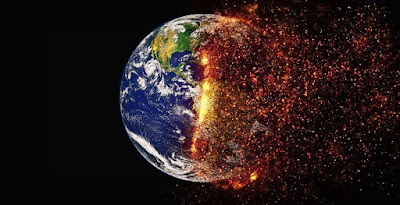The relationship between water and armed conflict-an introduction
an introduction
Water plays a major role in human life, both individuals and groups, as the first human gatherings were established on the banks of rivers, but all the great civilizations that existed in ancient times were water and the presence of rivers a major reason for their establishment (for example, the Mesopotamian civilization that was established on the banks of the Tigris rivers The Euphrates and the Nile Valley Civilization that was founded on the banks of the Nile River).
The volume of fresh water is about (35 billion km3), which is equivalent to (2.5%) of the Earth’s water volume of (1.4 billion km3).
The available of this fresh water for human use is only (0.3%) and the rest is either frozen or found in the hollow. Thus, only 100 thousand km 3 of fresh water remains for human use. These frightening numbers indicate the scarcity and limitations of fresh water compared to the increase in the world's population and the tremendous development in all sciences, in which water plays the most prominent role.
This water shortage in developing countries is linked to the spread of diseases and epidemics, as more than (80%) of the diseases of citizens of developing countries are caused by polluted waterwater.
and that (10 million) people die annually around the world for the same reason.
According to United Nations reports, about (20 thousand) A child dies annually due to the consequences of water shortage, and about a quarter of a billion people in twenty-six countries around the world at the present time, their per capita share of water annually does not exceed (1000 m3) of water, which threatens to cause more than two billion people within Thirst line by 2050.
and more than (2.1 billion) people around the world lack safe drinking water services, and about (4.5 billion) people lack health facilities services. About (340 thousand) children die annually due to diarrheal diseases, and someone suffers from Every ten people in the world suffer from water scarcity, and (90%) of natural disasters are related to water.read more
Also, reports issued by the United Nations Environment Program indicated that more than half of the world's population will live until 2030 in areas suffering from water shortages.
Water enjoys special protection under international humanitarian law, as Article 54 of Additional Protocol I to the Geneva Conventions of 1977 states: “It is prohibited to attack, destroy, transfer or disrupt objects and materials indispensable to the survival of the civilian population, for example foodstuffs and agricultural areas.” and crops, livestock, drinking water utilities and networks, and irrigation works).read more

Comments
Post a Comment
Thank you for comment